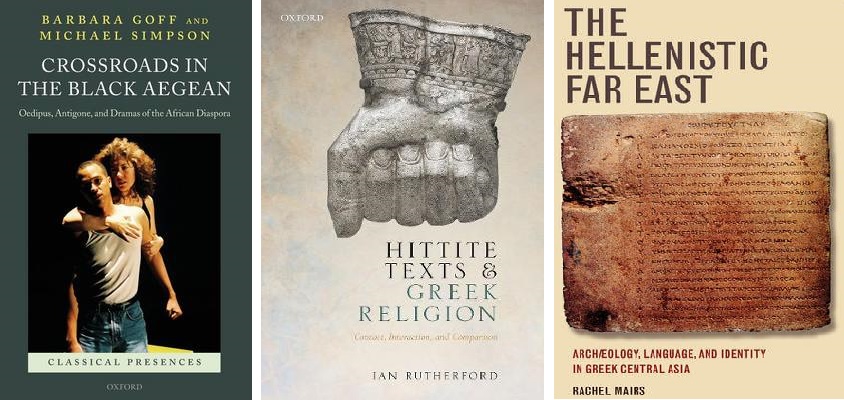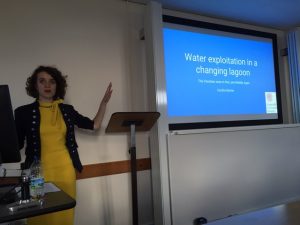
Authors: Dr. Alexia Petsalis-Diomidis & Prof. Barbara Goff. Edits: Bunny Waring.
Date: 7th May 2021.

In April 2021, the Classical Association opened its annual conference – held online this year due to the pandemic – with a panel on Inclusive Classics. Inspired in part by the ‘Towards a more inclusive Classics’ workshop held in June 2020, the panel was convened and run by the Inclusive Classics Initiative, headed by Professor Barbara Goff (University of Reading) and Dr Alexia Petsalis-Diomidis (University of St Andrews). The aim of this Initiative is to open discussions within the discipline about marginalised groups, both in terms of their experiences during antiquity and their interactions with the subject today. The Initiative also works to bridge the gap between Classics in higher education and Classics at secondary schools, thus bringing together more perspectives within the discipline.
The panel, entitled ‘Inclusive Classics and pedagogy: teachers, academics and students in conversation’, opened with a series of spotlight talks. These covered a wide range of topics, including disability in the Classics curriculum, examining the influence of race on Classical art, applying queer theory to Classics, equality of access to classical languages and highlighting the launch of Classics Caring Network. A binding theme shared by the various speakers was the idea that inequalities in the wider world are reflected within the discipline. These spotlight talks, by early-career classicists, will be available on the Classical Association website.
 Following on from the spotlight talks, the panel moved onto considering the teaching and learning experience of Classics in relation to inclusivity, both at undergraduate level and in the context of secondary education. Participants were wowed by the eloquence of two school students (from Runshaw College in Lancashire and Pimlico Academy in London), who spoke about the perception of Classics as the subject of the privileged elite, with limited real-world application. Equally interesting was the insight from teachers from the same schools, who explained how they are reforming traditional approaches to Classics, such as by deemphasising the importance of masters and slaves and examining issues of gender in the ancient world.
Following on from the spotlight talks, the panel moved onto considering the teaching and learning experience of Classics in relation to inclusivity, both at undergraduate level and in the context of secondary education. Participants were wowed by the eloquence of two school students (from Runshaw College in Lancashire and Pimlico Academy in London), who spoke about the perception of Classics as the subject of the privileged elite, with limited real-world application. Equally interesting was the insight from teachers from the same schools, who explained how they are reforming traditional approaches to Classics, such as by deemphasising the importance of masters and slaves and examining issues of gender in the ancient world.
Break-out rooms gave participants the opportunity to ‘meet’ and exchange responses about what they had heard. The final ‘closing remarks’ of the panel saw many other intriguing presentations – on topics like the initiative to find new unseen Latin passages representing a wider variety of perspectives and backgrounds, how institutions can make Classics more inclusive in terms of race and social class, the new EDI officers at the Classical Association, the weaponization of debates surrounding Classics in an increasingly polarised public forum, the ways in which academia could do more to support those with disabilities (particularly visual impairments), the contemporary social and political context within which the Inclusive Classics Initiative is operating and the need for a free and pluralistic discourse for academic inquiry to flourish.

The Inclusive Classics Initiative has organised a second workshop for the 1st and 2nd of July 2021, hosted online by the Institute of Classical Studies and supported by the CUCD teaching committee. Issues discussed will include ‘Planting the seeds of Inclusive Classics in school contexts’, ‘Embedding inclusive practices in institutions’, ‘Decentring Athens, Rome and the canon’ and ‘Lecturers and students in collaboration’. Until then, the Initiative’s heads would like to thank all those who (virtually) attended the panel and, above all, the speakers: Lauren Canham, Amy Coker, Tristan Craig, Hardeep Dhindsa, Katherine Harloe, Arlene Holmes-Henderson, Victoria Leonard, Claude MacNaughton, Justine McConnell, Neville Morley, Isabel Ruffell, Rosie Tootell, Joe Watson, Tim Whitmarsh, Bobby Xinyue and the two school students.










 Fear is a driving force behind human action, capable of pushing people to either exceed their own expectations or to prevent them from acting at all. As a powerful motivator, the emotion of fear had a pervasive presence in ancient life and thought. This is reflected in multiple ways throughout literature, juxtaposed with motivation, social interaction and power dynamics. Furthermore, as early as Aristotle’s Poetics, fear had already been understood as a ruling force and powerful notion for the construction of literary genres, especially tragedy. While evaluating the ancient literature as an integral part of understanding such a concept, the diverse influences of different fields of study, such as literary criticism, political theory, psychoanalysis, and philosophy, can add valuable insights.
Fear is a driving force behind human action, capable of pushing people to either exceed their own expectations or to prevent them from acting at all. As a powerful motivator, the emotion of fear had a pervasive presence in ancient life and thought. This is reflected in multiple ways throughout literature, juxtaposed with motivation, social interaction and power dynamics. Furthermore, as early as Aristotle’s Poetics, fear had already been understood as a ruling force and powerful notion for the construction of literary genres, especially tragedy. While evaluating the ancient literature as an integral part of understanding such a concept, the diverse influences of different fields of study, such as literary criticism, political theory, psychoanalysis, and philosophy, can add valuable insights.







